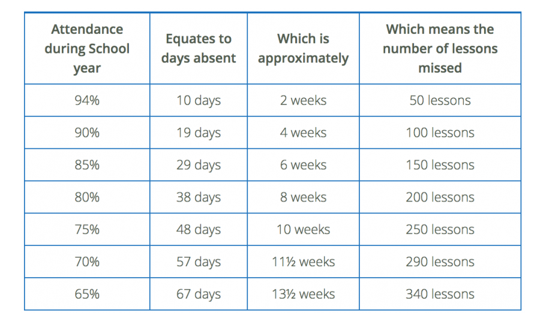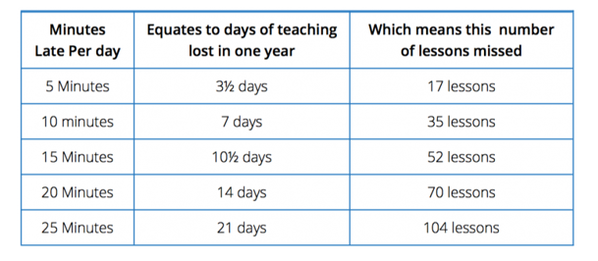Attendance: Why It Matters | Promoting Good Attendance & Punctuality | Meet Our Attendance/Punctuality Team | Punctuality | Attendance
Parental Engagement |Parent & Carer Support| PTA | Parent & Carer Cafes| Lunch Menus | Uniform
Parental Engagement |Parent & Carer Support| PTA | Parent & Carer Cafes| Lunch Menus | Uniform
ATTENDANCE: WHY IT MATTERS
Encouraging regular school attendance is one of the most powerful ways you can prepare your child for success – both in school and in life. We believe our Hamleteers are capable of amazing things and want them to have every opportunity to achieve this success.
Our aim is for all of our Hamleteers to achieve 100% attendance, but we know that this is not always possible. Therefore we would like to aim for every child to achieve at least 96% attendance – no matter their circumstances. Having 96% attendance is the equivalent to missing 9 whole school days a year, so this really should be a manageable target.
Ensuring excellent attendance requires partnership; you can help us to help your child by encouraging regular school attendance.
Going to school every day means:
All children aged between 5 and 16 are required by law to receive an education, and it is the duty of parents and carers to ensure that they are supported to do so.
Key facts:
Children are required to attend school for 190 days each year. The Government’s target for attendance for primary school pupils is at least 95%. How does your child’s attendance compare with this target? The table below indicates how just a few days absence can result in children missing a significant number of lessons. It has been proven that children who miss a lot of school achieve less.
Our aim is for all of our Hamleteers to achieve 100% attendance, but we know that this is not always possible. Therefore we would like to aim for every child to achieve at least 96% attendance – no matter their circumstances. Having 96% attendance is the equivalent to missing 9 whole school days a year, so this really should be a manageable target.
Ensuring excellent attendance requires partnership; you can help us to help your child by encouraging regular school attendance.
Going to school every day means:
- Lots of opportunities for learning new skills
- Developing a better understanding of themselves and the world
- Making friends and building lasting relationships
- Developing healthy life habits
- Feeling connected to the school community
- Taking part in exciting and memorable activities
- And having lots of fun!
All children aged between 5 and 16 are required by law to receive an education, and it is the duty of parents and carers to ensure that they are supported to do so.
Key facts:
- Research shows that children with higher attendance at school achieve better both in their exams and in later life.
- A two week holiday in term time, will automatically drop attendance to 95% and can have a severe impact on children who might not find learning easy.
- 90% attendance is the equivalent to one month off every school year. Over the 7 years of primary school, this is the same as missing almost one whole school year!
- Children who have persistently poor attendance can suffer more commonly from friendship issues and find it harder to build lasting relationships.
- You can be fined and prosecuted if your child’s attendance becomes a serious issue. You will be referred to the Southwark Education Inclusion Team (EIT), a team of Senior Education Welfare Officers and legal proceedings can and will be taken where necessary.
Children are required to attend school for 190 days each year. The Government’s target for attendance for primary school pupils is at least 95%. How does your child’s attendance compare with this target? The table below indicates how just a few days absence can result in children missing a significant number of lessons. It has been proven that children who miss a lot of school achieve less.
Effects of Non-Attendance:
Late Arrival at School
When a child arrives late at school, they miss important events and activities like our daily early work, assembly, teacher instructions, introductions and key messages for the day. Children also feel embarrassed at having to enter the classroom late.
Our gates open at 8:45am where the Core Leadership Team meet our Hamleteers and families. The children enter the classroom immediately, where the teachers are ready to receive them with the early work for that morning. The registers are taken promptly at 8:55am. We encourage our children to arrive as close as possible to 8:45am to take advantage of this extra time in the classroom.
The table below indicates how frequent lateness can add up to a considerable amount of learning being lost. This can seriously disadvantage children and disrupt the learning of others. Please help children in your care to be punctual.
Effects of Late Arrival at School:
When a child arrives late at school, they miss important events and activities like our daily early work, assembly, teacher instructions, introductions and key messages for the day. Children also feel embarrassed at having to enter the classroom late.
Our gates open at 8:45am where the Core Leadership Team meet our Hamleteers and families. The children enter the classroom immediately, where the teachers are ready to receive them with the early work for that morning. The registers are taken promptly at 8:55am. We encourage our children to arrive as close as possible to 8:45am to take advantage of this extra time in the classroom.
The table below indicates how frequent lateness can add up to a considerable amount of learning being lost. This can seriously disadvantage children and disrupt the learning of others. Please help children in your care to be punctual.
Effects of Late Arrival at School:



